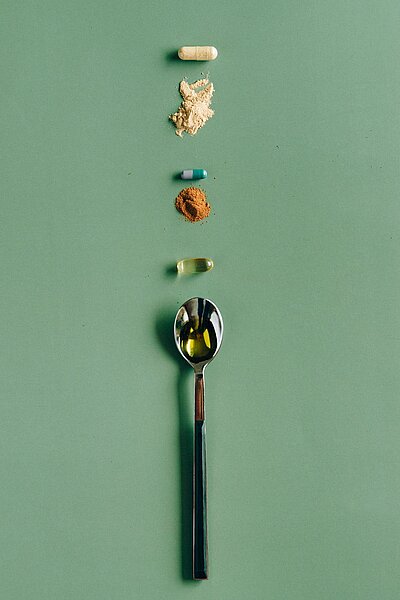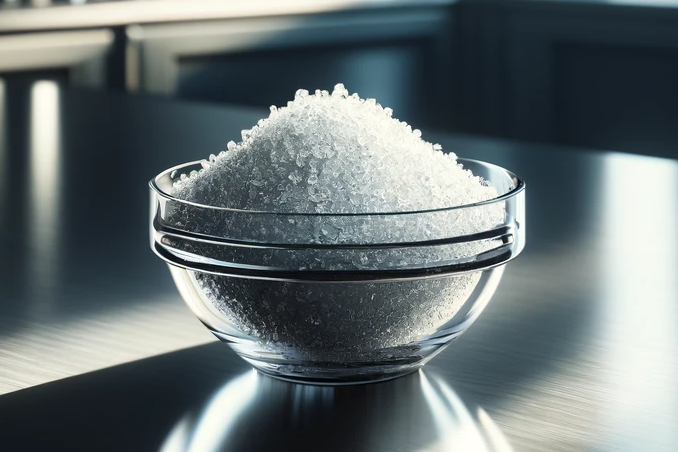Potassium citrate

Potassium citrate is an organic source of potassium that can be used as a straight feed or as an additive in complete dog food. Potassium is an important mineral that is required for many functions in the body, such as the regulation of the water balance, the transmission of nerve impulses or muscle contraction. Potassium citrate also has the property of increasing the pH value of the urine, i.e. alkalizing it. This can be helpful for certain urinary stones that form in acidic urine.
What are urinary stones and how do they form?
Urinary stones are solid deposits of various substances that can form in the urinary tract of dogs. They can vary in size, shape and composition. The most common types of urinary stones in dogs are struvite stones and oxalate stones. Struvite stones consist of magnesium, ammonium and phosphate and often form in connection with a bacterial urinary tract infection. Oxalate stones consist of calcium and oxalic acid and can be favored by various factors, such as a genetic predisposition, a high calcium intake or chronic kidney disease.
Urinary stones can cause various symptoms, depending on where they are located and how large they are. Possible signs include blood in the urine, frequent or difficult urination, pain when urinating or urinary retention. Urinary stones can also lead to inflammation or obstruction of the urinary tract, which can be life-threatening. It is therefore important to consult a vet if urinary stones are suspected.
How can potassium citrate help with urinary stones?
Potassium citrate can help prevent or dissolve struvite stones by increasing the pH value of the urine. Struvite stones dissolve in alkaline urine, whereas they grow in acidic urine. By administering potassium citrate, the urine pH can be raised by about 0.2 per 0.5 g of potassium citrate. The optimum target range for the urine pH is around 6.5 to 7. To determine the urine pH, you can use special test strips or have a urine sample examined by a vet.
Potassium citrate can be mixed into the food as a powder or administered as a paste or tablets. The dosage depends on the dog's body weight and should be individually adjusted by the vet. A general recommendation for adult dogs is 0.25 to 0.5 g per 5 kg body weight to supplement potassium or up to 3 g per 10 kg body weight to increase urine pH. However, the maximum daily amount should not be exceeded.
What are the advantages and disadvantages of potassium citrate?
Potassium citrate has some benefits for dogs with or at risk of struvite stones. It can accelerate the dissolution of existing stones and prevent the growth of new ones. It can also reduce the formation of other types of urinary stones that can also form in acidic urine, such as urate stones or cystine stones. Potassium citrate is also a natural source of potassium, which can be useful for dogs with a potassium deficiency.
However, potassium citrate also has some disadvantages or limitations. It is not suitable for dogs with or at risk of oxalate stones as these can grow in alkaline urine. It is also not suitable for dogs with kidney disease, heart disease or high blood pressure as these can lead to excess potassium. Potassium citrate can also interfere with the absorption of some medications, such as antibiotics or painkillers. You should therefore always consult your vet before giving your dog potassium citrate.
Potassium citrate is an organic source of potassium that can increase the pH value of urine. This can help prevent or dissolve struvite stones that form in acidic urine. However, potassium citrate is not suitable for all dogs and should only be administered after consultation with a vet. In addition to the administration of potassium citrate, other measures should also be taken to prevent urinary stones, such as a balanced diet, adequate fluid intake and regular monitoring of the urine pH.
If you notice any signs of hypersensitivity or poisoning in your dog, you should see your vet immediately. We are not a substitute for a vet, but we try to be as accurate as possible. Every dog reacts differently and we recommend you get a second opinion or consult your vet if in doubt.
Stay healthy and take good care of your four-legged friend!😊
Similar to Potassium citrate
Potassium chloride (KCl) is the potassium salt of hydrochloric acid. It forms colorless, salty-bitter tasting crystals that dissolve well in water. Potassium chloride is approved as a food additive...
Sodium citrate (trisodium citrate) is the sodium salt of citric acid, an organic acid that occurs naturally in citrus fruits. It is known for its ability to regulate pH and stabilize metal ions in...
Magnesium citrate is a compound that is formed when magnesium oxide reacts with citric acid. This combination makes it a magnesium salt that is valued in animal nutrition for its good solubility and...
Calcium citrate is an organic compound of calcium and citric acid. It is a white powder or granulate that dissolves well in water. Calcium citrate has an acidic taste and can be used as an acidifier...



